Module 3 Unit 1 Has it arrived yet?课件(共38张PPT) 2023-2024学年初中英语外研版八年级下册
文档属性
| 名称 | Module 3 Unit 1 Has it arrived yet?课件(共38张PPT) 2023-2024学年初中英语外研版八年级下册 | 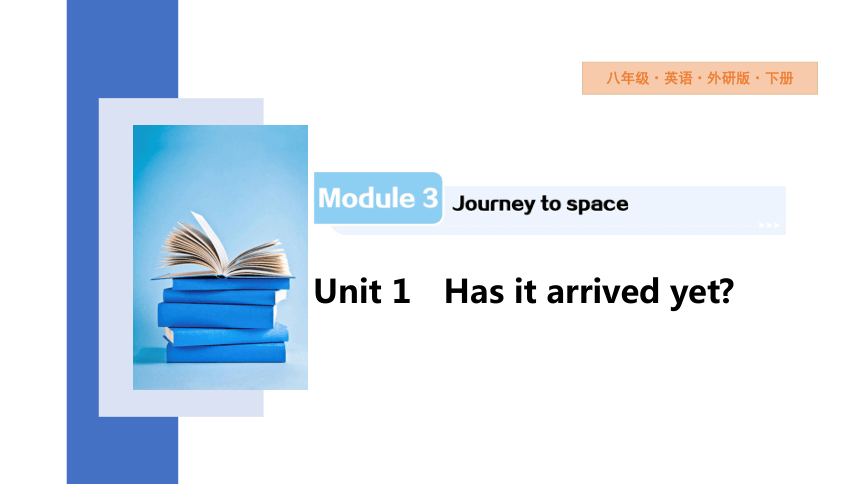 | |
| 格式 | pptx | ||
| 文件大小 | 773.5KB | ||
| 资源类型 | 教案 | ||
| 版本资源 | 外研版 | ||
| 科目 | 英语 | ||
| 更新时间 | 2024-02-28 11:22:52 | ||
图片预览

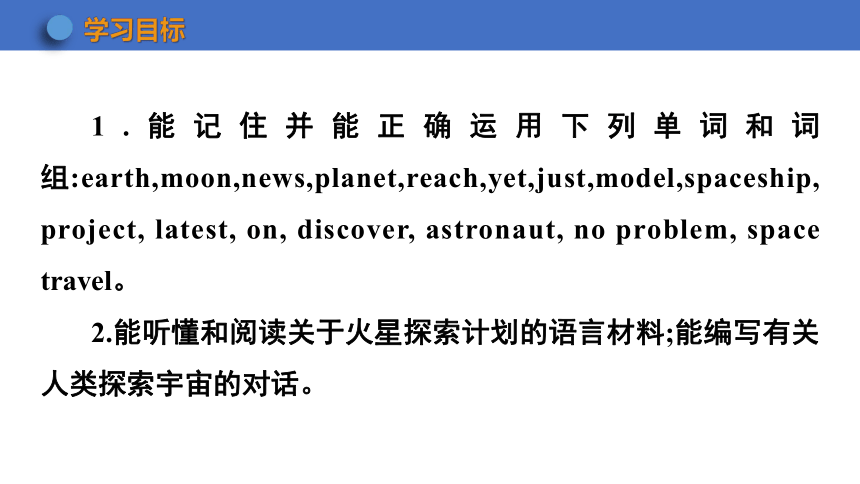

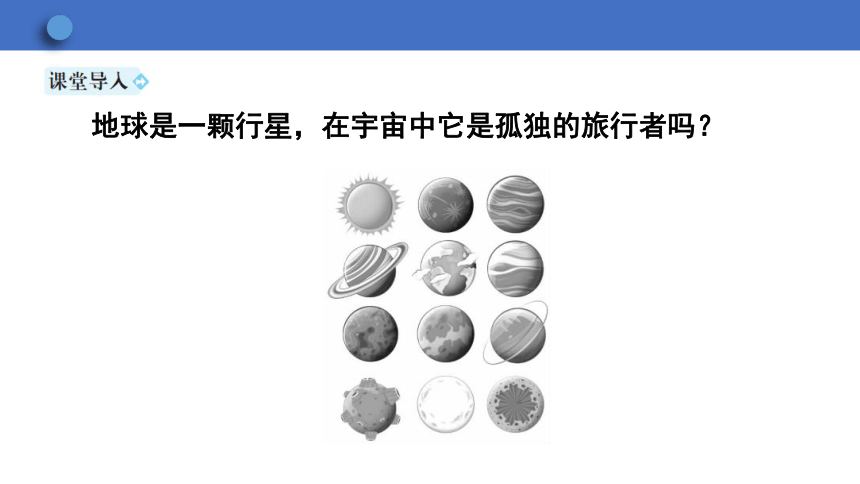
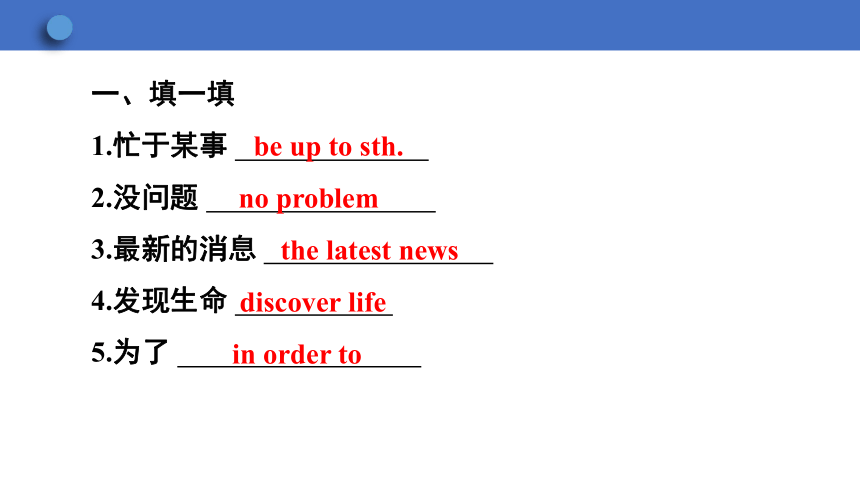
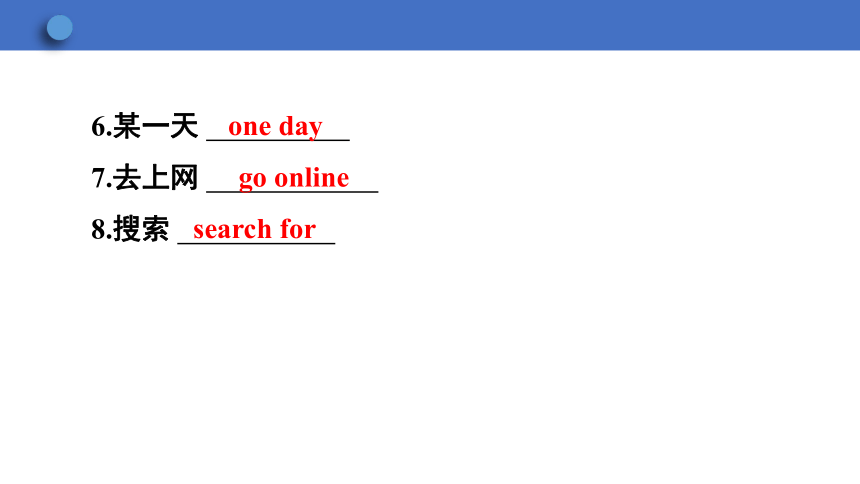
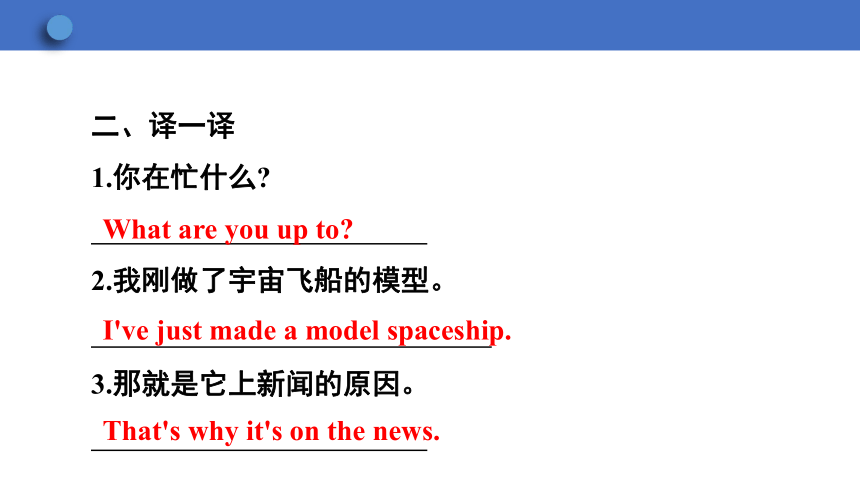
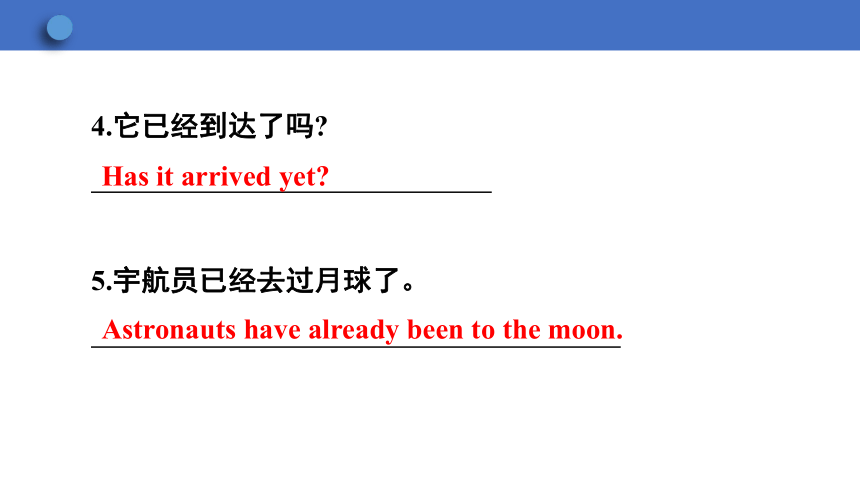
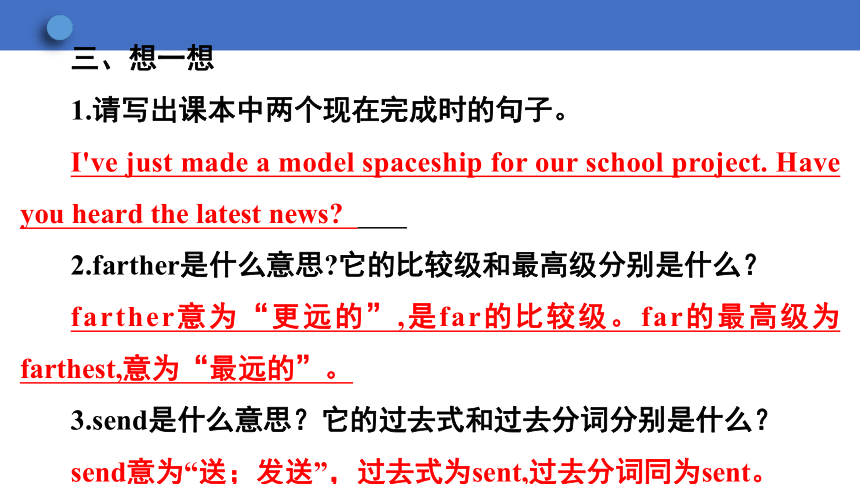
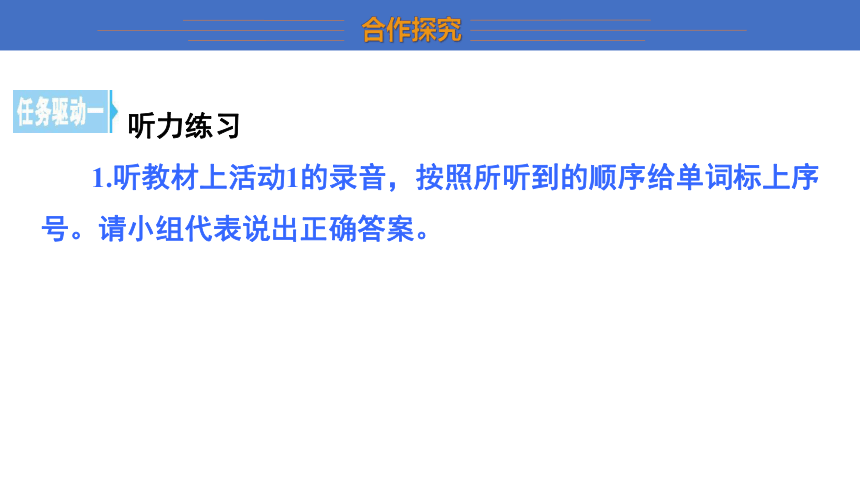
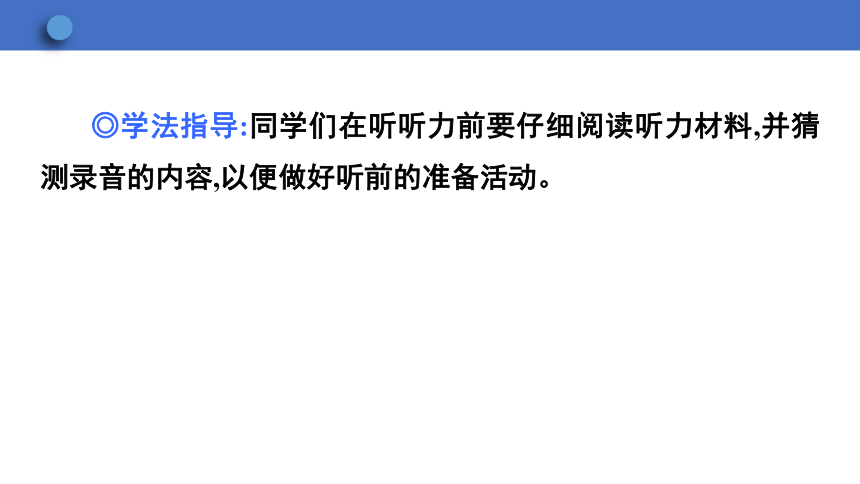
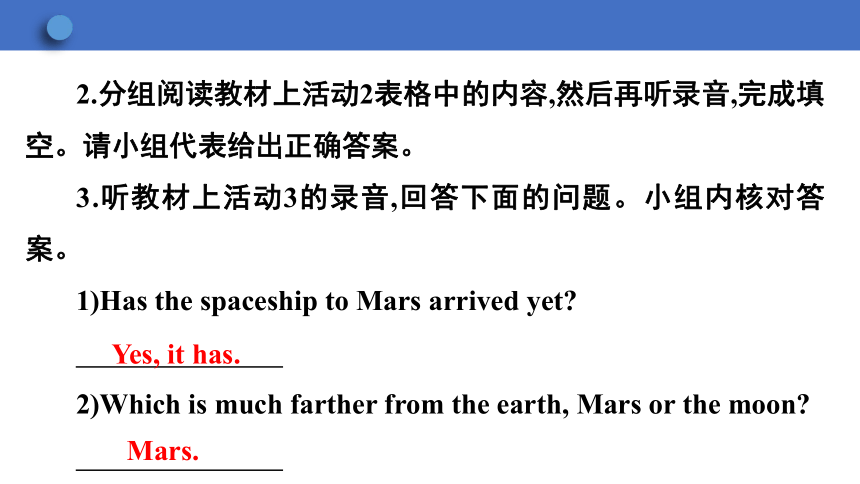
文档简介
(共38张PPT)
八年级·英语·外研版·下册
Unit 1 Has it arrived yet
1.能记住并能正确运用下列单词和词组:earth,moon,news,planet,reach,yet,just,model,spaceship, project, latest, on, discover, astronaut, no problem, space travel。
2.能听懂和阅读关于火星探索计划的语言材料;能编写有关人类探索宇宙的对话。
3.能在小组活动中积极与他人合作,相互帮助,共同完成学习任务, 尽情享受学习的乐趣,培养自主学习的意识。
◎课时重点:
能运用现在完成时描述人类对太空的探索。
地球是一颗行星,在宇宙中它是孤独的旅行者吗?
一、填一填
1.忙于某事
2.没问题
3.最新的消息
4.发现生命
5.为了
be up to sth.
no problem
the latest news
discover life
in order to
6.某一天
7.去上网
8.搜索
one day
go online
search for
二、译一译
1.你在忙什么
2.我刚做了宇宙飞船的模型。
3.那就是它上新闻的原因。
What are you up to
I've just made a model spaceship.
That's why it's on the news.
4.它已经到达了吗
5.宇航员已经去过月球了。
Has it arrived yet
Astronauts have already been to the moon.
三、想一想
1.请写出课本中两个现在完成时的句子。
I've just made a model spaceship for our school project. Have you heard the latest news
2.farther是什么意思 它的比较级和最高级分别是什么?
farther意为“更远的”,是far的比较级。far的最高级为farthest,意为“最远的”。
3.send是什么意思?它的过去式和过去分词分别是什么?
send意为“送;发送”,过去式为sent,过去分词同为sent。
听力练习
1.听教材上活动1的录音,按照所听到的顺序给单词标上序号。请小组代表说出正确答案。
◎学法指导:同学们在听听力前要仔细阅读听力材料,并猜测录音的内容,以便做好听前的准备活动。
2.分组阅读教材上活动2表格中的内容,然后再听录音,完成填空。请小组代表给出正确答案。
3.听教材上活动3的录音,回答下面的问题。小组内核对答案。
1)Has the spaceship to Mars arrived yet
2)Which is much farther from the earth, Mars or the moon
Yes, it has.
Mars.
阅读练习
1.分组、分角色朗读教材上活动3的对话,然后两人一组表演对话。
◎学法指导:同学们在填写时要注意动词的过去分词是否是规则的。
跟读对话
1.完成教材上的活动5,注意细听录音中重读的单词,并画出来。再听录音,并跟读录音。
2.分组列出在航天旅行中我们已经做的和没有做的事情,完成教材上的活动6。比一比,哪组写出的句子又多又正确。
3.两人一组以问答的形式谈论活动6中写下的内容,完成教材上的活动7。
完成任务所需的语言结构:
—Have we sent a spaceship to Mars
—Yes, we have.But...
●I haven't started yet.我还没有开始。
辨析:just, already和yet
1.just 用在现在完成时的肯定句中,表示“刚刚”。例如:
He has just had his meal.他刚吃完饭。
2.already一般用在完成时态的肯定句中,可以放在句尾和句中。例如:
He has already gone home.他已经回家了。
already若用在疑问句中,常表示吃惊的语气,此时already常放在句末。例如:
Have you finished already 你已经完成了吗 (我以为你没有做完,表示出乎意料)
3.yet一般用在完成时态的否定句和疑问句中;放在否定句句尾时表示“还”;放在疑问句句尾时表示“已经”。例如:
Have you found your ruler yet 你已经找到尺子了吗
[做一做]单项选择。
( )1.—Well, have you seen the film
—Yes.Two weeks ago.
A.still B.already
C.yet D.just
C
( )2.I have sung this English song,but she hasn't.
A.already B.yet
C.never D.just
A
●What are you up to 你在干什么
be up to sth.是固定短语,意为“正在做某事,忙于某事”。
What are you up to 等于What are you doing 例如:
What is he up to with all those books on the floor 这么多书放在地上,他在干什么
be up to sb.则表示“由某人决定”。例如:
—Do you want to stay or go 你是留下来还是走呢
—It's up to you.由你决定。
[做一做]单项选择。
( )1.—What are you up
—I am showing my friends around our school.
A.at B.to C.for D.in
B
( )2.It's to them to decide who should be the captain.
A.down B.off
C.up D.away
C
●Astronauts have already been to the moon.宇航员已经去过月球了。
辨析:have(has) been in, have(has) been to和have(has) gone to
1.have(has) been in 意为“已经在某地待了多长时间”,常与表示一段时间的状语连用。例如:
Mr. Brown has been in Shanghai for three days. 布朗先生来上海已经有三天了。
2.have(has) been to意为“已经去过某地”,表示现在已经不在那里了,可与just, ever, never等连用。例如:
I've just been to the post office. 我刚才去邮局了。
3.have(has) gone to 意为“已经去了某地”,表示到了某地或正在去某地的途中。总之,说话时该人不在现场,一般不用第一和第二人称代词作句子的主语。例如:
—Where is Tom 汤姆在哪里
—He has gone to the bookshop.他到书店去了。
[做一做]单项选择。
( )1.—Have you ever to Hangzhou
—No, I haven't.
A.been B.be
C.go D.gone
A
( )2.—Where is Jane
—She Beijing.
A.has gone to B.have gone to
C.has been to D.have been to
A
●现在完成时
当表示动作已经完成,并对现在有一定影响时,我们用现在完成时。同时,可分别用just,already 或yet加以强调或说明。例如:
I have just heard the news.我刚听到消息。
Astronauts have already been to the moon.宇航员已经去过月球了。
可以看出,just用来表示“刚刚”,already用来表示“已经”,两者都用于肯定句中,一般置于have/has之后。在否定句中则可用yet,表示“还未”,有“以后可能会”的含义。例如:
The scientists have not heard from it yet.科学家们还没有收到它发出的信息。
Man has not discovered any life in space yet.人类尚未在太空中发现生命。
[做一做]单项选择。
( )1.Our visitors have come and I must go now.
A.yet B.never
C.already D.just
C
( )2.I haven't decided when to buy a car .
A.never B.ever
C.already D.yet
D
( )1.—Have you heard the news about the war between the two countries
—No, I haven't.
A.late B.later
C.latest D.lately
C
( )2.That's I think spoken English is very important.
A.what B.why
C.when D.whether
B
( )3.—What are you up to
—
A.I am doing my homework.
B.I went home.
C.I have seen the film.
D.I will go to see my grandfather.
A
( )4.She France twice.She doesn't want to go now.
A.has gone to
B.has gone in
C.has been in
D.has been to
D
( )5.We searched the whole forest the girl.
A.at B.on C.for D.in
C
八年级·英语·外研版·下册
Unit 1 Has it arrived yet
1.能记住并能正确运用下列单词和词组:earth,moon,news,planet,reach,yet,just,model,spaceship, project, latest, on, discover, astronaut, no problem, space travel。
2.能听懂和阅读关于火星探索计划的语言材料;能编写有关人类探索宇宙的对话。
3.能在小组活动中积极与他人合作,相互帮助,共同完成学习任务, 尽情享受学习的乐趣,培养自主学习的意识。
◎课时重点:
能运用现在完成时描述人类对太空的探索。
地球是一颗行星,在宇宙中它是孤独的旅行者吗?
一、填一填
1.忙于某事
2.没问题
3.最新的消息
4.发现生命
5.为了
be up to sth.
no problem
the latest news
discover life
in order to
6.某一天
7.去上网
8.搜索
one day
go online
search for
二、译一译
1.你在忙什么
2.我刚做了宇宙飞船的模型。
3.那就是它上新闻的原因。
What are you up to
I've just made a model spaceship.
That's why it's on the news.
4.它已经到达了吗
5.宇航员已经去过月球了。
Has it arrived yet
Astronauts have already been to the moon.
三、想一想
1.请写出课本中两个现在完成时的句子。
I've just made a model spaceship for our school project. Have you heard the latest news
2.farther是什么意思 它的比较级和最高级分别是什么?
farther意为“更远的”,是far的比较级。far的最高级为farthest,意为“最远的”。
3.send是什么意思?它的过去式和过去分词分别是什么?
send意为“送;发送”,过去式为sent,过去分词同为sent。
听力练习
1.听教材上活动1的录音,按照所听到的顺序给单词标上序号。请小组代表说出正确答案。
◎学法指导:同学们在听听力前要仔细阅读听力材料,并猜测录音的内容,以便做好听前的准备活动。
2.分组阅读教材上活动2表格中的内容,然后再听录音,完成填空。请小组代表给出正确答案。
3.听教材上活动3的录音,回答下面的问题。小组内核对答案。
1)Has the spaceship to Mars arrived yet
2)Which is much farther from the earth, Mars or the moon
Yes, it has.
Mars.
阅读练习
1.分组、分角色朗读教材上活动3的对话,然后两人一组表演对话。
◎学法指导:同学们在填写时要注意动词的过去分词是否是规则的。
跟读对话
1.完成教材上的活动5,注意细听录音中重读的单词,并画出来。再听录音,并跟读录音。
2.分组列出在航天旅行中我们已经做的和没有做的事情,完成教材上的活动6。比一比,哪组写出的句子又多又正确。
3.两人一组以问答的形式谈论活动6中写下的内容,完成教材上的活动7。
完成任务所需的语言结构:
—Have we sent a spaceship to Mars
—Yes, we have.But...
●I haven't started yet.我还没有开始。
辨析:just, already和yet
1.just 用在现在完成时的肯定句中,表示“刚刚”。例如:
He has just had his meal.他刚吃完饭。
2.already一般用在完成时态的肯定句中,可以放在句尾和句中。例如:
He has already gone home.他已经回家了。
already若用在疑问句中,常表示吃惊的语气,此时already常放在句末。例如:
Have you finished already 你已经完成了吗 (我以为你没有做完,表示出乎意料)
3.yet一般用在完成时态的否定句和疑问句中;放在否定句句尾时表示“还”;放在疑问句句尾时表示“已经”。例如:
Have you found your ruler yet 你已经找到尺子了吗
[做一做]单项选择。
( )1.—Well, have you seen the film
—Yes.Two weeks ago.
A.still B.already
C.yet D.just
C
( )2.I have sung this English song,but she hasn't.
A.already B.yet
C.never D.just
A
●What are you up to 你在干什么
be up to sth.是固定短语,意为“正在做某事,忙于某事”。
What are you up to 等于What are you doing 例如:
What is he up to with all those books on the floor 这么多书放在地上,他在干什么
be up to sb.则表示“由某人决定”。例如:
—Do you want to stay or go 你是留下来还是走呢
—It's up to you.由你决定。
[做一做]单项选择。
( )1.—What are you up
—I am showing my friends around our school.
A.at B.to C.for D.in
B
( )2.It's to them to decide who should be the captain.
A.down B.off
C.up D.away
C
●Astronauts have already been to the moon.宇航员已经去过月球了。
辨析:have(has) been in, have(has) been to和have(has) gone to
1.have(has) been in 意为“已经在某地待了多长时间”,常与表示一段时间的状语连用。例如:
Mr. Brown has been in Shanghai for three days. 布朗先生来上海已经有三天了。
2.have(has) been to意为“已经去过某地”,表示现在已经不在那里了,可与just, ever, never等连用。例如:
I've just been to the post office. 我刚才去邮局了。
3.have(has) gone to 意为“已经去了某地”,表示到了某地或正在去某地的途中。总之,说话时该人不在现场,一般不用第一和第二人称代词作句子的主语。例如:
—Where is Tom 汤姆在哪里
—He has gone to the bookshop.他到书店去了。
[做一做]单项选择。
( )1.—Have you ever to Hangzhou
—No, I haven't.
A.been B.be
C.go D.gone
A
( )2.—Where is Jane
—She Beijing.
A.has gone to B.have gone to
C.has been to D.have been to
A
●现在完成时
当表示动作已经完成,并对现在有一定影响时,我们用现在完成时。同时,可分别用just,already 或yet加以强调或说明。例如:
I have just heard the news.我刚听到消息。
Astronauts have already been to the moon.宇航员已经去过月球了。
可以看出,just用来表示“刚刚”,already用来表示“已经”,两者都用于肯定句中,一般置于have/has之后。在否定句中则可用yet,表示“还未”,有“以后可能会”的含义。例如:
The scientists have not heard from it yet.科学家们还没有收到它发出的信息。
Man has not discovered any life in space yet.人类尚未在太空中发现生命。
[做一做]单项选择。
( )1.Our visitors have come and I must go now.
A.yet B.never
C.already D.just
C
( )2.I haven't decided when to buy a car .
A.never B.ever
C.already D.yet
D
( )1.—Have you heard the news about the war between the two countries
—No, I haven't.
A.late B.later
C.latest D.lately
C
( )2.That's I think spoken English is very important.
A.what B.why
C.when D.whether
B
( )3.—What are you up to
—
A.I am doing my homework.
B.I went home.
C.I have seen the film.
D.I will go to see my grandfather.
A
( )4.She France twice.She doesn't want to go now.
A.has gone to
B.has gone in
C.has been in
D.has been to
D
( )5.We searched the whole forest the girl.
A.at B.on C.for D.in
C
同课章节目录
- Module 1 Feelings and impressions
- Unit 1 It smells delicious.
- Unit 2 I feel nervous when I speak Chinese .
- Unit 3 Language in use
- Module 2 Experiences
- Unit 1 I've also entered lots of speaking competi
- Unit 2 They have seen the Pyramids.
- Unit 3 Language in use
- Module 3 Journey to space
- Unit 1 Has it arrived yet?
- Unit 2 We have not found life on any other planet
- Unit 3 Language in use
- Module 4 Seeing the docto
- Unit 1 I haven't done much exercise since I got m
- Unit 2 We have played football for a year now
- Unit 3 Language in use
- Module 5 Cartoons
- Unit 1 It's time to watch a cartoon.
- Unit 2 Tintin has been popular for over eighty yea
- Unit 3 Language in use
- Revision module A
- Module 6 Hobbies
- Unit 1 Do you collect anything ?
- Unit 2 Hobbies can make you grow as a person.
- Unit 3 Language in use
- Module 7 Summer in Los Angeles
- Unit 1 Please write to me and send me some photos
- Unit 2 Fill out a form and come to learn English
- Unit 3 Language in use
- Module 8 Time off
- Unit 1 I can hardly believe we are in the city ce
- Unit 2 We thought somebody was moving about
- Unit 3 Language in use
- Module 9 Friendship
- Unit 1 Could I ask if you've mentioned this to he
- Unit 2 I believe that the world is what you think
- Unit 3 Language in use
- Module 10 On the radio
- Unit 1 I hope that you can join us one day
- Unit 2 It seemed that they were speaking to me in
- Unit 3 Language in use
- Revision module B
